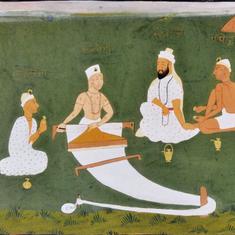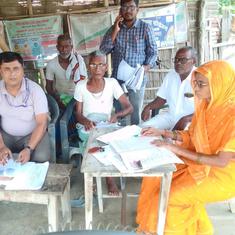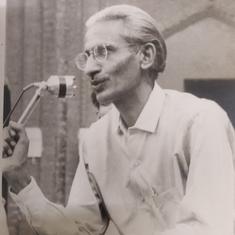The first phase of the special intensive revision of Bihar’s voter list concludes on Saturday. By all accounts, the Election Commission of India did not have it easy.
It battled criticism from the Opposition parties, the press and the civil society and the intensive revision was challenged in court. It was asked by the Supreme Court to explain the rationale and timing of the exercise.
The poll body had cited the need for a fresh electoral roll as it claimed that the current list has been corrupted by voter migration, urbanisation and undocumented immigrants.
The unprecedented exercise it designed for Bihar demanded that every voter would have to prove that they are Indian citizens before being allowed to vote. Those with their names in the 2003 electoral roll – the last time an intensive revision was carried out in Bihar – were assumed to be Indian citizens provided they produced a copy of the voter list from 22 years ago.
By the Election Commission’s own estimate, at least 2.93 crore voters would have to produce documentary proof to have their names retained on the electoral roll, with only months to go for the Assembly poll in the state.
On July 21, the commission filed an affidavit to justify the revision before the Supreme Court, which has scheduled a hearing on July 28.
Though the Election Commission did not agree to the Supreme Court’s suggestion to include Aadhaar cards and ration cards in the list of documents to prove citizenship, the affidavit suggests that the avalanche of criticism might have forced the poll body to modify its stand in other ways.
The affidavit shows that, halfway through the revision, the Election Commission postponed the collection of eligibility documents, which many residents of Bihar are reportedly struggling to procure. Moreover, it scrambled to get figures on the availability of documents such as birth certificates and passports in Bihar, suggesting that the commission had embarked on the intensive roll revision without considering this crucial data.
The numbers so far
At least 61.1 lakh voters in Bihar, or 7.7% of the state’s electorate, could not be found at their homes at the end of the first phase, according to a statement from the Election Commission on July 24.
Of these, 21.6 lakh were found to have died, 31.5 lakh to have “permanently migrated” and seven lakh to be enrolled in multiple places. A list of these voters has been shared with political parties, who have the opportunity to point out any errors.
In addition to this, the Election Commission has not received the enumeration forms of seven lakh voters and one lakh voters are untraceable.
For voters whom the commission could locate, this does not mean a reprieve.
Starting August 1, they will be asked to produce documents – even prove their citizenship – to remain on the new voter list.
A climbdown
When the Election Commission announced the special intensive revision, it had said that during the house-to-house enumeration by booth level officials, or BLOs, voters will have to fill up enumeration forms and produce documents to prove their citizenship.
But the commission took a sharp turn soon after the revision began.
On June 24, a press note by the body said that BLOs will collect enumeration forms from the public “along with required documents”.
These required documents could be the 2003 voter list or one of the 11 documents electors can produce to prove that they are Indian citizens.
The official instructions from the same day emphasised this too. Clause (e) from Section 3 said that each elector must submit the enumeration form “along with requisite information and self-attested documents to the BLO”.
These documents will be uploaded on an Election Commission app, said Clause (g), and BLOs will “verify the documents during his visit to the house of the elector”.
But the poll body changed its procedure mid-way. In an advertisement in the Hindi daily Dainik Bhaskar on July 6, it said that if voters did not have the required documents and photographs, “then just submit the enumeration form to the BLO”.
When the Opposition pointed to this change, the commission insisted that “there is no change in the instructions”, even though ground reports found the opposite.
In its July 21 affidavit before the Supreme Court, the poll body admitted it was following a new procedure. “That it is imperative to note that at the stage of filing enumeration forms, the existing electors have been given the option of filing the said forms with/without eligibility documents, which can be adduced at a later stage as well,” says the affidavit.
The later stage means the claims and objections stage, adds the affidavit, which begins on August 1 and ends on September 1, according to the official instruction.
As things stand, the task of collecting and verifying citizenship documents has been kicked down the road.
An official at the Election Commission told Scroll that there is no readily available data on how many voters have submitted eligibility documents. “Documents are being collected [from] whoever is providing,” said the official. “Others can provide up to September 1, at least.”
A new rationale
When the revision was announced in June, the Election Commission gave several reasons for conducting the exercise.
One was to maintain the integrity of the voter list in Bihar. Another was to ensure that all eligible citizens are included in the list and that ineligible voters were excluded.
The body said it wanted to eliminate names of “dead/shifted/absentee voters” and include “young citizens” who had become eligible to vote.
It also said that the inclusion of names of “foreign illegal immigrants” had necessitated the revision.
But after a month of criticism from the Opposition, chiefly the Indian National Congress and the Rashtriya Janata Dal, who have alleged that the exercise risks disenfranchising millions of voters, the commission cited a new reason for the revision.
This has been laid out in its July 21 affidavit.
“That political parties across the spectrum have also voiced serious concerns regarding the accuracy of electoral rolls revised through the summary revision process, regarding the presence of names of deceased, shifted and non-citizens in the electoral roll,” the commission said. “To address these concerns and restore public confidence, the Commission has resolved to undertake the SIR…”
This rationale was not mentioned anywhere in the poll body’s initial communication. Opposition leaders had alleged that this reason had been conveyed to them in a meeting with the chief election commissioner and the election commissioners on July 2.
This was not the only post-facto justification for the exercise produced by the commission.
The data on documents
According to the Election Commission’s order, voters in Bihar who do not find their names in the 2003 voter list can submit at least 11 documents to prove that they are citizens.
This includes birth certificate, passport, education certificate, domicile certificate, caste certificates, among others.
Critics have pointed out using data that a majority of Bihar’s voters do not have these documents. This, they said, could create widespread problems during the verification stage and result in large-scale disenfranchisement.
To rebut this, the Election Commission has attached data on the availability of these documents in the affidavit, which it sought from various departments of the Bihar government.
For instance, one of the petitioners who moved court against the exercise had submitted news reports that claimed that only 2.4% of Bihar’s population had passports.
The poll body, however, cited data to show that a total of 36.5 lakh passports have been issued in the state. Assuming all of them have been issued to electors, however, this still means only 4.6% of Bihar’s population have passports.
Similarly, the state has issued 3.93 crore birth certificates between 2001 and 2024, which is about 49.7% of the total electorate, the poll body has submitted. However, only a handful of these would be useful for voters since those born after 2007 are not eligible to enroll as voters as they are yet to turn 18.
On the other hand, the Election Commission claims that 13.9 crore residence certificates have been issued in the state between 2011 and 2025, citing a July 16 letter by the state government’s directorate of economics and statistics. This is a striking claim, since the state’s chief electoral officer in January this year had projected that the population of the state would be 13 crore in 2025.
Curiously, all the commission’s communications to the Bihar government to obtain this data is from July.
For instance, Bihar’s chief electoral officer asked for data on passports, birth certificates, caste certificates and educational certificates from the state government on July 15.
He received most of them over the next few days, but some at the last minute. For instance, the figures on passports on the morning of July 21 – hours before the affidavit was filed in the Supreme Court.
Since none of these communications are dated before June 24, the day it announced the revision, it is safe to assume that the Election Commission did not have this data before it plunged ahead.
It procured them once the revision was challenged in the highest court and it was asked to prove the efficacy and constitutionality of the exercise.










